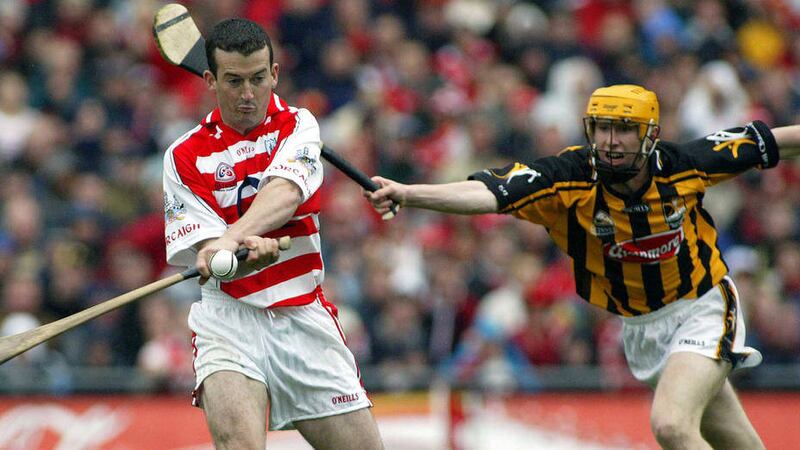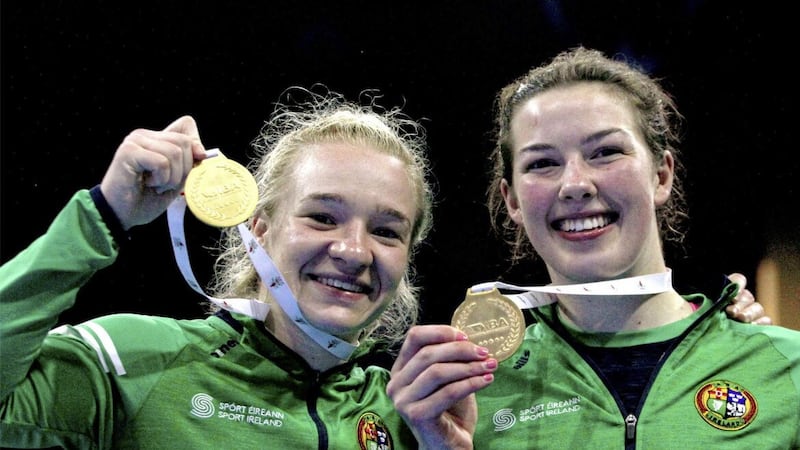ONE of the most enjoyable games I’ve covered for the Irish News this year was the NHL Division Two promotion/relegation play-off clash between Donegal and Tyrone at Celtic Park.
They may be a comfortable distance away from hurling’s top table, but the three encounters involving Donegal and Tyrone in 2015 have left an indelible mark on the year. The most nail-biting of the trilogy was their play-off on April 18. It was a magnificent advertisement for the lower echelons of inter-county hurling.
Donegal got off to a flyer, with Ciarán Mathewson and Jack O’Loughlin raising green flags. Tyrone battled back and got goals of their own from Conor Grogan and Damien Casey. The Tyrone hurlers showed incredible resilience. But then, so too did Donegal.
In the face of a second half onslaught, Donegal dug deep and pulled away in the closing stages to win by four points. Both sets of players emptied themselves.
The best post-match quote of the year was uttered by Donegal’s centre half-back Jamesie Donnelly. He said: “I’m playing for Donegal 15 years and this is as big a day as I’ve ever had – to stay in Division Two – because I’ve my one-year-old son here and my nephew at the match. We don’t want the next generation playing down the leagues.”
Tyrone manager Mattie Lennon was inconsolable after the Red Hands missed out on promotion. On that sunny day in Celtic Park, Donegal’s best performers were Jamesie Donnelly, Seán McVeigh, Lee Henderson and Ronan McDermott. Imagine if a ‘Team Ulster’ was formed and Donnelly, McVeigh, Henderson and McDermott were recruited.
On that sunny day in Celtic Park, Tyrone’s best performers were the irrepressible Damien Casey, Conor Grogan and Gerard Gilmore. Imagine if a ‘Team Ulster’ was formed and Casey, Grogan and Gilmore were recruited.
What impact would ‘Team Ulster’ have on Donegal and Tyrone's county squads? It would demoralise them.
The same applies to the hurlers of Down, Derry and Armagh. For a county to lose its best players would be the greatest disincentive known to Ulster hurling.
On The Sunday Game, Donal Óg Cusack re-opened the debate and insisted the key remedy for hurling in the northern hinterlands was to create a ‘Team Ulster’.
In his pomp, Donal Óg was a player I hugely admired.
He reinterpreted and revolutionised the art of goalkeeping in the same way Dublin’s Stephen Cluxton has managed in Gaelic football. His autobiography Come What May is one of the bravest, most insightful sports books ever written.
Donal Óg has also shone brightly in his punditry role on The Sunday Game. But being a great player doesn’t insulate you from propagating bad ideas.
Donal Óg’s biggest mistake in promoting ‘Team Ulster’ is that it is so casually conceived it lacks any real substance. It’s a weak and giddy idea that sounds impressive when it’s thrown out there on a Sunday evening from the Donnybrook studios but it smashes into a millions pieces under the merest hint of scrutiny.
In fairness to Donal Óg, he’s afforded only a few seconds to articulate the reasons why he thinks ‘Team Ulster’ is a good idea.
On Monday evening I texted him to enquire if he would be interested in doing an interview with The Irish News so that he could explain in greater detail and reach beyond The Sunday Game sound-bites. But, of course, the detail is exactly where ‘Team Ulster’ falls down.
Donal Óg replied to the text and - impolitely - declined to do an interview. If ‘sledging’ existed via text message, Donal Óg’s reply ticked all the boxes.
It’s a genuine pity Donal Óg didn’t avail of the interview opportunity.
Curiously, ‘Team Ulster’ only gathers a bit of momentum when Antrim’s senior hurlers suffer an inevitable slump in fortunes.
But to constantly link ‘Team Ulster’ with Antrim’s poor performances is a desperately flawed way of looking at the problems of Ulster hurling.
To keep doing so is akin to a doctor continually misdiagnosing an illness.
‘Team Ulster’ is singularly designed to add a bit of vanity to the Liam MacCarthy Cup – but there’s a good chance that it would even fall short of this objective.
‘Team Ulster’, sadly, is not the great idea of our time. It’s not the great fertiliser of Ulster hurling.
In fact, in all likelihood it would be the reverse. It would ensure that Ulster hurling would remain in its impoverished state.
To promote this lofty notion of a representative provincial team would run down county squads and, potentially, lower the prestige of the Christy Ring, Nicky Rackard and Lory Meagher competitions because the best players at those levels could be in with a shout of a 'Team Ulster' call-up.
'Team Ulster' would most definitely ensure the prevailing ambivalence displayed by some county boards towards the small-ball game would degenerate into outright apathy.
Participation levels would almost certainly fall.
Logistically, 'Team Ulster' would be a nightmare. Where would they train? Who would pay for this non-entity of a hurling team that would struggle to create any meaningful fan base?
It's hard to escape the conclusion that 'Team Ulster' is the purist form of elitism within the GAA.
It would look after the 30 best players in the nine counties. Talking 'Team Ulster' is an exercise in extravagant dream-peddling.
There is no question clubs and county boards must do more to grow hurling here - but Croke Park and the Ulster Council need to devise a vision.
It needs to be grassroots-based. It needs energy and raging ambition – and it needs money, the kind of money that was pumped into Dublin hurling in the last 10 years.
In the words of former Antrim star Terence McNaughton: “There is something seriously wrong in Antrim when kids leaving primary school have never seen a hurling stick.
“We’ve coaches going around in Antrim but they’re only ticking boxes… Going into schools for six weeks a year is not participation.
“A school playing in a blitz at the end of the year is not participation. Participation is playing hurling every week.”
McNaughton was specifically talking about Antrim. You could apply the same logic across the province. It's time to stop applying a sticking-plaster to a gaping wound.







